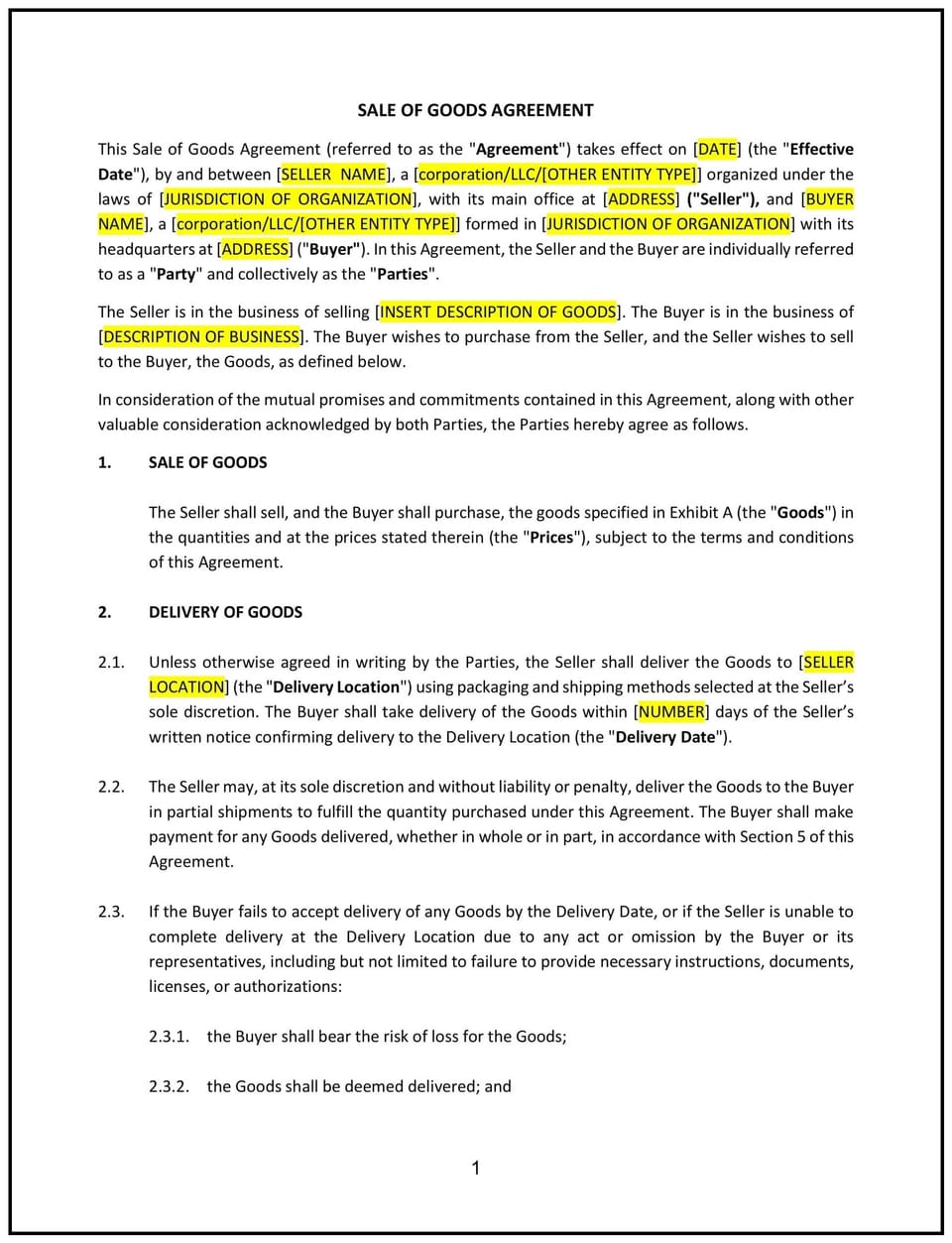Sale of Goods Agreement (Pro-Seller) (Arkansas): Free template

Sale of Goods Agreement (Pro-Seller) (Arkansas)
A Sale of Goods Agreement (Pro-Seller) in Arkansas is a legally enforceable contract that governs the terms of a transaction between a seller and a buyer. This agreement ensures that the seller's rights and financial interests are protected by clearly outlining payment terms, delivery responsibilities, risk allocation, and warranty disclaimers. It is particularly useful for Arkansas businesses involved in wholesale distribution, manufacturing, agriculture, and e-commerce, where the sale of goods is a key component of operations.
Arkansas follows Uniform Commercial Code (UCC) Article 2, which regulates the sale of goods, including terms for warranties, risk of loss, and buyer obligations. Sellers in Arkansas can use this agreement to formalize transactions, reduce disputes, and ensure timely payments. Given the state’s strong agricultural sector, businesses dealing in commodities and perishable goods may benefit from including terms that address product quality, inspection periods, and delivery conditions.
A properly structured agreement can help Arkansas sellers manage risks associated with delayed payments, rejected shipments, and liability for damaged goods while supporting compliance with state laws and UCC provisions.
Tips for drafting and maintaining a Sale of Goods Agreement (Pro-Seller) in Arkansas
- Clearly define the type of goods being sold, whether manufactured products, agricultural commodities, or wholesale items, along with details on quality expectations and specifications.
- Outline payment structures, including due dates, installment options, and penalties for late payments. Arkansas law allows sellers to impose interest on overdue payments if the terms are clearly stated in the agreement.
- Specify the conditions for delivery, including timelines, shipping methods, and which party is responsible for transportation costs. Under Arkansas UCC provisions, risk of loss typically transfers to the buyer upon delivery unless the agreement states otherwise.
- Address warranty disclaimers to limit seller liability. Arkansas law allows businesses to exclude implied warranties of merchantability and fitness for a particular purpose if explicitly stated in the contract.
- Detail return and refund policies, particularly for industries like agriculture and retail, where products may be subject to quality inspections before acceptance. Arkansas sellers may limit returns or issue refunds only under specific conditions if clearly disclosed in the contract.
- Include a force majeure clause to protect against liability in cases of unforeseen events such as extreme weather, supply chain disruptions, or labor shortages, which can significantly impact Arkansas-based sellers.
Frequently asked questions (FAQs)
Q: What should Arkansas businesses include in a Sale of Goods Agreement (Pro-Seller)?
A: The agreement should cover product descriptions, pricing, payment deadlines, delivery terms, warranty limitations, and dispute resolution procedures to protect the seller.
Q: How does a Sale of Goods Agreement (Pro-Seller) benefit Arkansas sellers?
A: It ensures sellers receive timely payments, minimizes disputes, and provides legal protection in case of buyer non-compliance.
Q: Are disclaimers of warranties enforceable in Arkansas?
A: Yes, under Arkansas UCC Article 2, sellers can disclaim implied warranties such as merchantability and fitness for a particular purpose, provided the disclaimer is written clearly in the contract.
Q: What happens if a buyer refuses to pay under a Sale of Goods Agreement in Arkansas?
A: The seller may take legal action to recover damages, enforce the payment terms, or reclaim the goods, depending on the terms of the contract.
Q: How should Arkansas sellers handle disputes under a Sale of Goods Agreement?
A: Businesses should include a dispute resolution clause specifying whether issues will be settled through Arkansas courts, arbitration, or mediation.
Q: Does Arkansas require sales tax on goods sold under this agreement?
A: Yes, most sales of tangible goods in Arkansas are subject to state and local sales taxes. Sellers are responsible for collecting and remitting sales tax unless the transaction qualifies for an exemption.
Q: Can a seller refuse returns under a Sale of Goods Agreement in Arkansas?
A: Yes, a seller can implement a no-return policy, provided this restriction is disclosed in the contract and does not violate consumer protection laws.
This article contains general legal information and does not contain legal advice. Cobrief is not a law firm or a substitute for an attorney or law firm. The law is complex and changes often. For legal advice, please ask a lawyer.


